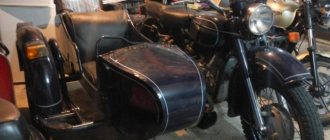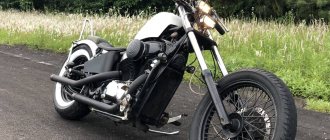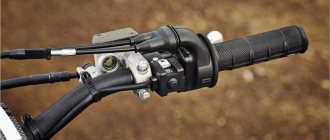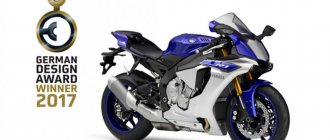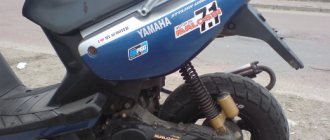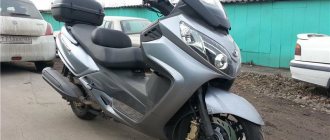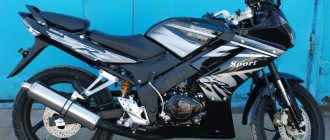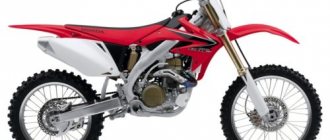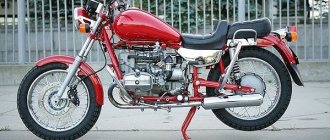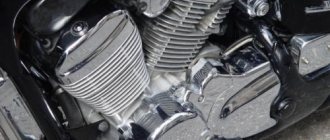Technical indicators
A small list of characteristics of the model is worth considering in detail, identifying its advantages and disadvantages:
| Dimensions (length; width; height) | 243; 162; 105 cm |
| Weight | 320 kg |
| Maximum speed | 100 km/h |
| Fuel tank volume | 21 l. |
| Maximum load | 260 kg |
| Engine | 4-stroke 2-cylinder air-cooled |
| Fuel consumption | 5.8 l/100 km |
| Engine capacity | 650 cc cm |
| Start | Kickstarter |
| Piston parameters (stroke; diameter) | 6.8; 7.8 cm |
| Engine power | 32 l. With. at 5200 rpm |
| Brakes | Shoe |
| Suspensions (front; rear) | Telescopic fork with shock absorber; adjustable lever spring-hydraulic |
Despite the relatively small dimensions, the driver and passengers can make even long trips in comfort. The powerful 650 cc 4-stroke engine provides the rider with more than 30 hp. With. The maximum speed of the Dnepr MT 9 motorcycle does not exceed 100 km/h, however, this figure is quite good for the model. Low fuel consumption (5–6 liters on a combined cycle) is also a huge advantage of the technology.
In the photo, the Dnepr MT 9 has undergone minor changes, thanks to which it looks more attractive and modern.
Dnepr MT 9
Hai! Such a famous domestic motorcycle as the Ninth Dnepr MT cannot be ignored. All About Moto will help you understand why. This iron horse has many advantages compared to other two/three-wheeled vehicles of the USSR era. On our portal you can easily find diagrams of the engines or electrical equipment of these motorcycles.
Description of MT Dnepr 9 with photo
A lot of representatives of this line were once produced, primarily for the domestic needs of the country. Most of them are actively used in our time. I would immediately like to note that this production model of the bike was the first at KMZ to receive a high-quality automatic clutch release mechanism, which was simply innovative in those years.
And the presence of the ninth model of automatic ignition timing in the MT motorcycle was considered an innovation for 1971. The Kiev Motorcycle Plant was pleasantly pleased with the installation of a gearbox with reverse gear on this iron horse.
Today, not many people want to buy the Dnepr MT 9 in a used version. This is primarily due to the volume of fuel consumed by steel horses. Still, despite the high fuel consumption, this KMZ motorcycle has many advantages. It is considered the fastest of the Kyiv Dneprs. In addition, the ninth picks up speed very quickly, accelerating to hundreds faster than other boxer cars assembled in Ukraine.
The list of advantages of the MT 9 Dnepr motorcycle includes reviews regarding handling. You can ride this bike with an increased level of confidence. But it consumes less gasoline than other recent KMZ products. That is why this motorcycle has gained the greatest popularity among compatriots. The Kiev Motorcycle Plant was able to sell as many as three million of these serial steel horses.
The MT Dnepr-9 engine is a very high-quality power unit in comparison with other KMZ production models. The aerodynamic coefficient of this bike is impressive when compared with similar indicators of cargo-type domestic motorcycle equipment.
The fork of this motorcycle is perfectly adjustable in both planes. It's quite practical. In addition, tuning of the Dnieper of this model takes place everywhere. If you have a strong desire, you can even make a racing motorcycle out of it. To do this, of course, it is worth significantly lightening the motorcycle.
The Iron Horse also copes well even with difficult road conditions. Bad weather will not interfere with its operation. The sporty appearance of the bike is complemented by the excellent responsiveness of its engine to every increase in gas.
Engine MT-9
More than ten years ago, the Kiev plant switched to the production of motorcycles of the Dnepr family, which differs from the previous one mainly in the power unit. The current engine, despite its smaller displacement (650 cm3 instead of 750 cm3), has more power and better performance. This was achieved by introducing a number of modern design solutions. Thus, thanks to the replacement of roller bearings in the lower heads of the connecting rods with plain bearings (automotive bimetallic liners) and the use of a solid cast-iron crankshaft, the service life of the crank mechanism is increased and at the same time its repair is simplified. Bimetallic cylinders (aluminum jacket and cast iron liner) made it possible to significantly reduce the heat stress of the piston group compared to previous solid cast iron ones and ensure its performance during long-term driving in difficult road conditions.
And it is quite natural for the owners of motorcycles equipped with K-750 and K-750M engines to want to replace them with modern engines during repairs - MT9, MT10, MT10-36.
Let us immediately note that only the MT9 engine shown in the photo is suitable for replacement. It has a power of 32 hp. With. at 5200 rpm, has a six-volt (as in older models) electrical system and a PM302 breaker with a centrifugal ignition timing regulator that automatically changes the angle depending on the crankshaft speed. Other motors - MT10 and MT10-36 - have electrical equipment designed for 12 V. Therefore, their installation on motorcycles of the K-750 type involves major alterations that are impossible to do at home. The MT9 and K-750M engines are interchangeable in terms of seats, and installing a new engine usually does not cause difficulties.
However, some machines may require minor adjustments. So, when installing MT9, the ribs of the right cylinder head may rest against the stroller frame. In this case, you need to remove the tops of the ribs with a file in place. The front top engine cover may touch the wheel guard. To ensure the required gap (15-20 mm) between them, it is enough to make a corresponding depression on the shield with light blows of a hammer. Unlike the K-750M, in the MT9 engine, oil is supplied to the connecting rod bearings by a gear pump under pressure, which at average crankshaft speeds should be in the range of 3.0-6.0 kgf/cm2. A pressure drop in the system to 1.3 kgf/cm2 can lead to melting of the connecting rod bearings. Therefore, the operation of the lubrication system is controlled by a sensor, which is triggered at a pressure of 1.3 to 1.8 kgf/cm2. It is located on the right side of the engine housing. A 6 V test lamp with a socket must be connected to the sensor. Connect one wire from it to the sensor, and the other to ground. It is most convenient to place the lamp in the headlight housing. When the ignition is turned on, it lights up, and after starting the engine it should go out.
If the lamp is on when the engine is running, it means the lubrication system or sensor is faulty. In these cases, riding a motorcycle until the defect is detected and eliminated is unacceptable. It should be noted that when the engine is overheated or running at low idle speeds (630-700 rpm), the light may come on even if the lubrication system is working properly.
Since the required ignition timing for the MT9 engine is provided automatically, the ignition control cable must be disconnected from the lever (shifter) and removed.
It must be remembered that operating the MT9 engine with excessively early ignition (above the permissible angle of 36° before TDC) can lead to burnout of the pistons, since the temperature in the cylinder increases sharply. And another piece of advice: when operating a motorcycle in hot weather, it is advisable to use “cooler” spark plugs, for example A13H or A17B.
If the gearbox is in good condition and only the engine is replaced, you should install new intake pipes (65015258A and 65015259A), air corrector (65015-7), rubber sealing bushings (MT815125 - 2 pcs.), mounting clamps (MT8151-5 - 2 pcs. .) and rings (65015203—2 pcs.).
You can leave the old air filter, but in its upper part, at a distance of 14 mm from the upper edge of the housing, weld a tube with an outer diameter of 16 mm, an inner diameter of 14 mm and a length of 45 mm, which is then connected to the breather tube with a hose made of oil-gasoline-resistant rubber.
When operating a motorcycle in winter, an ice plug may form in the rubber tube, preventing gases from escaping from the crankcase, causing oil to leak through the gaskets and seals. To prevent this phenomenon, we recommend removing the rubber tube from the breather tube at zero temperatures and below.
And one last thing. The old exhaust system should be replaced with a new one. It includes the following parts: two muffler assemblies (KMZ-8.15312100); exhaust pipes - right cylinder (KMZ-8.15312104) and left (KMZ-8.15312107); two connecting pipes (KMZ-8.15312108); two muffler mounting ears (KMZ-8.15312103); a pair of muffler clamps (KMZ-8.15312225); two exhaust pipe fastening nuts (MT801508) and two o-rings (MT801510).
When installing exhaust pipe fastening nuts, the threads must be lubricated with graphite lubricant to protect them from corrosion and caking.
If the engine and gearbox assembly is being replaced, then installing new intake pipes and altering the filter will not be necessary, since the engine is equipped with these parts.
Since the new gearbox (with reverse gear) is slightly longer, when installing it on the K-750 and K-750M motorcycles, the driveshaft must be shortened on the hinge side to the required size. If the elastic coupling of the cardan touches the frame, it is enough to make a chamfer on the coupling disk and a recess on the frame. Additionally, you need to install a warning light, for example a PD-10G type flashlight, and connect it to the neutral gear sensor.
When installing an MT9 engine on a Dnepr-12 motorcycle, new mufflers will not fit, since they will interfere with the drive of the sidecar wheel. Therefore, the mufflers must be left as old ones - 75012-2-A, and the exhaust pipes must be of a new design. Here are their catalog numbers: МВ65012104 – exhaust pipe of the right cylinder and МВ65012107 – of the left cylinder, 65012108 – connecting pipe (there are two of them). The clamps and ears for attaching the mufflers and exhaust pipes will fit as before.
V. YARMAK, F. SHIPOTA, Kyiv engineers
Project Dnepr MT-9 “Rebirth”
Very often we look at the West with admiration, admiring their culture, achievements in design and ability to preserve technical heritage, ranting about how ours can’t do anything with their hands, and our motorcycles are no good. And few people undertake to raise theirs. Tries to improve, restore, preserve. Yes, there is no doubt that our heavy motorcycles were utilitarian three-wheeled “tanks,” but they were our tanks! And “Crusades” for potatoes and taking the family fishing meant more to everyone than gloss and lameness.
I remember how much joy this motorcycle brought to my family. How many impressions this Kiev stroller gave to me and my brother, the boys of that time. When time passed and my father passed away, my brother suggested scrapping the Dnieper, but I could not betray the memory of two generations of motorcyclists (my grandfather was the commander of a motor reconnaissance department in a tank regiment during the war) and decided to restore the old man MT-9. Yes, not just to restore driving performance, but to make it so that no one would ever have the thought that the old man belongs in the trash heap.
Being terribly busy with work and not having enough free time to completely immerse myself in the project, I turned to the Novorossiysk workshop “Bober's Garage” by Victor Bobyr with the desire to realize my plan. The task was simple - to make the motorcycle rideable and improve the exterior without making fundamental changes to the design. Driving ability would be expressed in city rides in good weather with some economic consideration (in principle I don’t have a car).
There are not many companies in Russia that produce tuning parts for once domestic, but now foreign, equipment, so we had to use a mixture of ours and bourgeois products that best suit the style of this retro European motorcycle. As a result, the exterior emerged, but somehow things didn’t work out with the stroller. At first they wanted to marry the German Stoye, then make a single one out of a veteran - their own cradle was hopelessly rusty, and it didn’t suit the style. I couldn’t get out of my head the Soviet factory cargo carriages and home-built wooden boxes, which facilitated the delivery of small (and not so small) cargo in state trade and various private traders.
We decided that there would be a wooden body instead of the factory cradle! With folding sides a la a truck, with latches and locks with brackets for awning eyelets or securing open cargo. A budget option was not considered, and to maintain the style, the box of the truck was beautifully made of oak laminated panels, covered with auto varnish with color, since the old man was already dressed up in a black tailcoat, newly painted with markings.
The result was a recognizable motorcycle, but without the dumpster homeless collective farm, such, in my opinion, a veteran proud of his history and a better-looking hard worker, like the kind our grandfathers dreamed of having when they returned from the war to raise the country from ruin. The exterior project is almost complete and requires some polishing. The mot moves on its own, which is what it did, moving from the workshop to my garage for the winter. For the winter, there are ideas to fight the ever-flowing engine, and, if the temperature allows, then drive with the settings.
Photographer friend Dmitry (Monah-evlampiy), a fan of the motorcycle movement, greatly contributed to the creation of a good picture of the completed one, which prompted me to post the result here.
A little about the components: 1. Motorcycle MT-9, 1971. 2. 18” Continental wheels 3. Voyage front axle with Brembo brakes. 4. Rear brakes and suspension are original. 5. Steering wheel from “Demons of Tranquility”. 6. Yamaha Dragster 400 steering columns. 7. Remote controls, grips, brake machine Harley aftermarket. 8. The engine is mechanically standard, Pekar K68 carbs. 9. Chinese mufflers from a “relative”. 10. The pilot's seat is standard, but reclining and with springs. 11. Electrics 12 volts according to a car model, on a relay. 12. Ignition Sovek + VAZ 2108. 13. Original headlight, stop Harley, the rest - Aliexpress. 14. Frame, tank, headlight, sidecar subframe are original standard. 15. Front fender Zim Nazzi, rear fender Harley standard. 16. Stroller box – oak panels with removable sides. 17. Color - black graphite with white markings. 18. KBMTS trunk and steps.
Technical characteristics of Dnepr MT 9
Length/width/height - 2430/1620/1050 mm. The wheelbase of the motorcycle from KMZ is 1500 mm. The bike track is 1140 mm. The highest recommended speed of this MT is 100 km. at one o'clock. The weight of the Dnieper is 320 kg. The maximum load is 260 kg. Fuel consumption is 5.8 liters per 100 kilometers. The volume of the working part of the engine is 650 cc. The cylinder diameter is 78 mm. The piston stroke of the cylinders is 68 mm. Compression - 7 to 1. Power Dnepr MT 9 - 32 horses. The maximum torque is 41.8 Nm. Fuel supply type: K-301 B carburetor. The clutch mechanism is a dry double-disc type. The main transmission is cardan. Gearbox ratios - 3.6 in the first; on the second 2.28; on the third 1.7 and 1.3 on the fourth. The electronics system is 6-volt. Tire size - R19. The volume of the MT 9 Dnepr gas tank is 21 liters. The oil volume in the motorcycle engine crankcase is 2.2 liters. The oil volume in the motorcycle gearbox is 1.3 liters. The oil volume in the air cleaner is 175 grams. The oil volume in the main gear housing is 100 grams.
- Back
- Forward
